from the you're-not-doing-yourselves-any-favors dept
It appears that music songwriters and publishers don't yet recognize that going on the attack against groups representing public interests and consumers' rights is a strategy destined to backfire. They just keep doing it, and it's really making them look both petty and petulant, with no desire to actually understand these issues. Instead, they just think the world owes them their business model, and anyone looking out for larger interests is, quite literally, "the enemy." We've already covered ASCAP's (
long planned)
attack on Creative Commons, EFF and Public Knowledge. These attacks are so distasteful that even many ASCAP supporters are
upset about them.
Now, it appears that the National Association of Music Publishers is getting in on the misplaced anger. In a recent speech, its CEO, David Israelite
lashed out at these groups, and lumped CEA and CCIA into the bunch. CEA and CCIA, of course, have both been pretty strong supporters of making sure that copyright law is not harming innovation or the economy. These are important issues if you believe that a stronger economy is important for everyone -- including musicians and songwriters -- but it appears that Israelite and the NAMP take a very narrow, zero-sum view of the world, which is that, if the gov't isn't handing over greater and greater protectionist policies, something's wrong -- and anyone who supports looking at the actual evidence should be shouted down as an enemy. It's not a position that can be supported by logic, so it's pure emotion:
But there is a growing enemy that does not have respect for copyright at all. And this is a very different enemy.
When the U.S. Government Accountability Office released a study in April on the economic impact of intellectual property piracy, the Electronic Frontier Foundation, Public Knowledge, the Consumer Electronics Assn. and the Computer and Communications Industry Assn. took out a full-page ad in newspapers around Washington, D.C. "Content industry piracy claims are bogus," the ad read. "For years, claims of huge losses from digital piracy have been used to justify harsh restrictions on innovators and consumers . . . They have harmed our competitiveness, hampered legitimate businesses and impeded innovation."
Who are these four groups and why would they take out full-page ads to suggest the ridiculous--that theft of intellectual property isn't really bad? The answer is, this is the new face of our enemy.
Yup. They call these groups "enemies" twice. Very subtle there. What's really glaring, however, is that Israelite doesn't even respond to the actual study at all. I mean, you would think that the
actual evidence presented by one of the few parts of the government that is widely respected for its objectivity in doing research, would be worth commenting on. Nope. He skips right over the actual evidence and blames these four groups for actually highlighting what the evidence says. And then he claims that they're "suggesting the ridiculous"? In other words, Israelite has taken such a faith-based position, that when actual evidence is presented that goes against his faith, he doesn't just shoot the messenger, he shoots anyone who repeats the message. Convincing.
These four groups have an extremist, radical anti-copyright agenda. They all have an economic interest in the theft of our music or paying little to nothing for it. [And] they are intellectually dishonest in how they approach these fights.
Radical extremists, huh? Isn't that what the Canadian politicians behind the new copyright law, James Moore, just
called critics of his bill? Sounds like the talking points on anyone actually interested in consumer rights is making the rounds, and "radical extremists" is the key phrase in trying to tar and feather anyone who suggests consumers have rights.
I have put together a top 10 list of the positions taken by these groups that I will define as their extremist, radical anti-copyright agenda.
Oh, do tell. This is going to be a great list, I'm sure. Please make sure that it's in Letterman-style countdown format too...
No. 10: They support changing the law to reduce damages for copyright infringement.
That's radical extremism? Wow. Of course, when the damages for copyright infringement are so far out of line with the actual harm of copyright infringement -- such that someone sharing a single album's worth of music for non-commercial purposes can be fined
$2 million -- it seems like it's actually kind of a pretty good question why the damages are so high. Even judges in these cases appear to find the damages results
laughable. When the damages are entirely out of line with actual harm, it seems perfectly reasonable to suggest they be brought more in line. How is that radical or extremist?
No. 9: They support the elimination of statutory damages for secondary copyright infringement.
Again, how is it either radical or extremist to suggest that liability for breaking the law should fall on those who actually break the law, rather than some 3rd party with deeper pockets? Personally, it seems a lot more radical to blame one party just because it's easier and they have more money, rather than those who actually break the law.
No. 8: They favor rolling back copyright extension; in some cases, radically.
Again, I'm at a loss as to how this is either radical or extremist. Actual evidence (again, the stuff Israelite would apparently prefer to avoid at all costs) has shown the net loss to society and culture from copyright extension. Our original copyright law lasted for, at most, 28 years. The entire
point of copyright law was supposed to enrich the public domain, but we haven't had anything enter the public domain in years, and it's unlikely we'll see much enter the public domain in our lifetime.
That seems radical.
No. 7: They favor the elimination of the songwriter and publisher rights for server, cache and buffer copies.
Again, this is not at all radical. Nor is it about "eliminating" rights. It's about accurately applying the law so that ridiculous results don't emerge -- such as cases where cache or buffer copies of songs require additional royalties and licenses, when they're clearly in transit. It was about not outlawing technology based on how long the wire is (i.e., the Cablevision case, where Israelite apparently supported the blatantly ridiculous position that a DVR hosted by Cablevision is illegal, because it hosts cached versions in transit, while the DVR in your home is legal).
No. 6: They oppose efforts to obtain the identities of individuals engaged in massive copyright infringement.
Not quite. They oppose efforts that expose individuals' privacy without fair and due process. Who knew it was "radical extremism" to insist on privacy rights and due process. These groups have no problem with exposing the identities of those who break the law when there is due process involved. It's hard to believe that Israelite is really suggesting that music publishers don't believe in due process or privacy rights.
No. 5: They support extreme versions of orphan works legislation.
Misleading again. Orphan works legislation is a red herring -- only brought about because of the ridiculous overreach in copyright law that wiped out the public domain. The sort of overreach that Israelite's group supported. So now when these groups try to fix one of the massive problems that this overreach created, it's dubbed "radical extremism." Yikes.
No. 4: They have filed legal briefs supporting anti-copyright positions of Grokster, Napster, LimeWire, Cablevision, Google, YouTube and Verizon.
Misleading in the extreme. None of those lawsuits involved "anti-copyright" positions, no matter how much the entertainment industry likes to spin these cases that way. The first three -- Grokster, Napster and LimeWire -- were never "anti-copyright" positions, they were questions about third party liability. Again these are just questions about who it's fair to blame: the user or the toolmaker. The entertainment industry wants to blame the toolmakers. Common sense says you blame the actual user. Claiming that a debate over properly applying liability is an "anti-copyright" position is deliberately dishonest. The Google/YouTube case is the same story. It's a case about liability. Not anti-copyright. The Cablevision case we described above. It was about whether or not the industry could veto technology based on the length of a wire. That's not anti-copyright at all.
Finally, it's pretty shocking that he includes Verizon in this list. I'm guessing he's referring to the RIAA's fight with Verizon way back when. To suggest that Verizon is "anti-copyright" is ridiculous. That was, yet again, a case about due process -- which I guess Israelite is admitting he doesn't believe in. This Verizon case involved the question of whether or not the RIAA could just demand Verizon hand over details of Verizon customers without a court-reviewed subpoena. The issue covered basic due process, which had nothing, whatsoever, to do with copyright.
It's really stunning how blatantly Israelite is basically admitting that due process is meaningless if you interfere with "his" business model.
No. 3: They oppose graduated-response protection for copyright owners.
Yes, it's "radical extremism" to support the view held
overwhelmingly by consumers that kicking people off the internet is punishment that does not come remotely close to fitting the "crime" of sharing, distributing and promoting music you love for free.
And, again, of course, most of the arguments against graduated-response efforts are due the clearly unconstitutional lack of due process involved: cutting people off the internet based on accusations rather than convictions is pretty radical and extremist. Actually fighting for due process? Not so much.
No. 2: They oppose treaties that support copyright enforcement like the Anti-Counterfeiting Trade Agreement.
Heh. This one is amusing, because he conveniently ignores the
serious problems with ACTA. They're not "opposed" to these treaties just for the hell of it, or because of some "radical extremist anti-copyright" position. They're opposed to it because it has all sorts of ridiculous language that will do serious harm. But, I guess for Israelite to realize that he'd have to look at the evidence, and he's less a fan of that than he is of supporting due process.
No. 1: They actually argue that illegal peer-to-peer file-sharing traffic helps the economy and doesn't hurt songwriters.
I'm actually not aware of any of those four groups actually saying that, but I
will say it. What's hurting songwriters is their inability to adapt to a changing market. The songwriters who
are adapting seem to be doing just fine. We write about them all the time, but Israelite won't read this blog, I'm sure, because it's filled with "evidence." Yes,
if you don't adapt to market changes, it can "hurt" your business. But that's what most of us here in capitalist America think is a good thing. Otherwise we'd all be riding around in horse buggies. So, sure, automobiles "hurt" the horse buggy market. And the printing press "hurt" the monks-writing-books business. But what happened? Much greater opportunities came about as a result, and the smart horse buggy makers who jumped ship to join automobile makers did just fine. We're seeing successful songwriters adapting all the time. It's just that they're doing it without kowtowing to Israelite and NAMP.
I don't see how any of that represents "radical extremism." I see plenty of attempts to falsely demonize those who believe in due process, privacy rights, consumer rights, innovation, correctly applying liability and (*gasp*) actual factual evidence. But, that's not radical extremism. It's called reality.
Filed Under: copyright, david israelite, music publishers
Companies: ascap, ccia, cea, creative commons, eff, namp, public knowledge




